
MeRT: An Innovative Stroke Recovery Treatment to Improve Your Brain Function
- A non-invasive, drug-free way to help your brain heal
- Tailored to your unique brain condition
- Can be used with or after other stroke rehabilitation therapies

Talk with Our New Patient Coordinator
She can answer your questions, explain the procedures, and review all details. Or fill in the form at the bottom of this page, and she will contact you.
Our Tailored Treatment Can Help You Overcome the Challenges of Stroke Recovery
A stroke is a frightening, life-changing experience. Even after immediate treatment, recovery can be a long and challenging process, depending on the stroke’s severity.
After-effects of a stroke can include physical, cognitive, and emotional issues. And it can be incredibly frustrating to go through the recovery process. Yet it’s vital to do everything you can to help your brain heal.
At the Brain Treatment Centers of Columbus and Cincinnati, we offer a new solution: MeRT, or Magnetic e-Resonance Therapy. MeRT is non-invasive, drug-free, and works to balance your brainwave activity.
No two strokes are alike — because no two brains are alike. That’s why we tailor our treatment to your unique brain situation.
We start with comprehensive EEG testing to map out your brain’s function. Then, with a program of targeted TMS (transcranial magnetic stimulation), we can improve brain communication.
We’ve seen some remarkable results using MeRT to treat post-stroke symptoms. With this treatment, you may see improvement faster than you ever thought possible.
How MeRT Treatment Can Help with Stroke Recovery
To understand how MeRT can help after a stroke, it’s important to know about neuroplasticity.
When you have a stroke, it will damage some brain cells and kill others. In the days or weeks after the stroke, your brain will work to repair the injured cells and remove the dead ones.
Then, your brain restructures the damaged area by changing the connections between brain cells. This is neuroplasticity — the brain “rewiring” itself naturally.
Think of the brain as a complex series of highways. When one road is damaged or destroyed, detours keep the traffic moving.
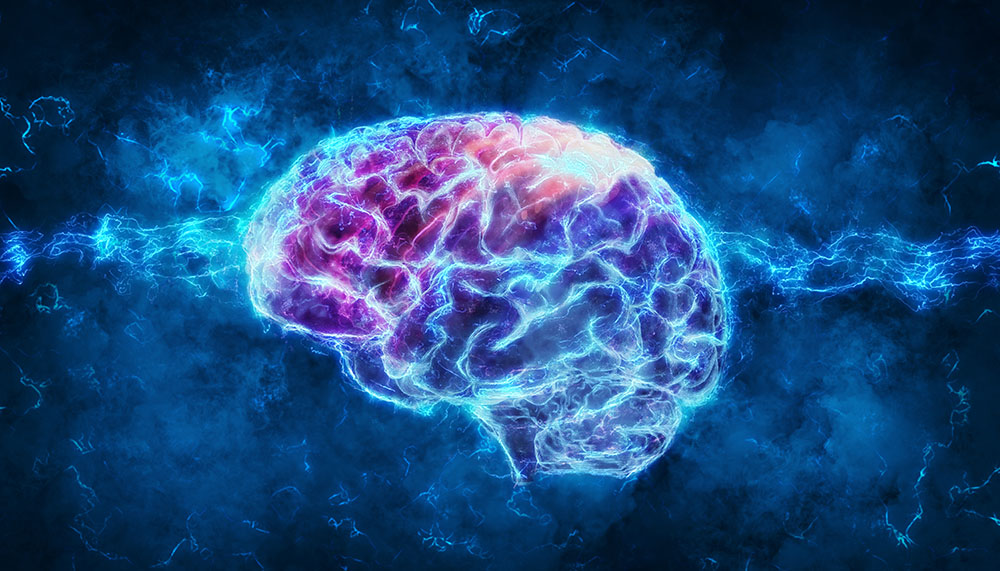
MeRT helps with this natural brain rewiring by using magnetic fields to stimulate and balance brain function.
Nothing can repair areas where brain cells have died, but MeRT can help your brain create new pathways around the injured area.
The equipment used in MeRT is FDA-cleared to treat Major Depressive Disorder and OCD and is used off-label to treat a wide variety of conditions, including stroke recovery.
Understanding Different Types of Stroke
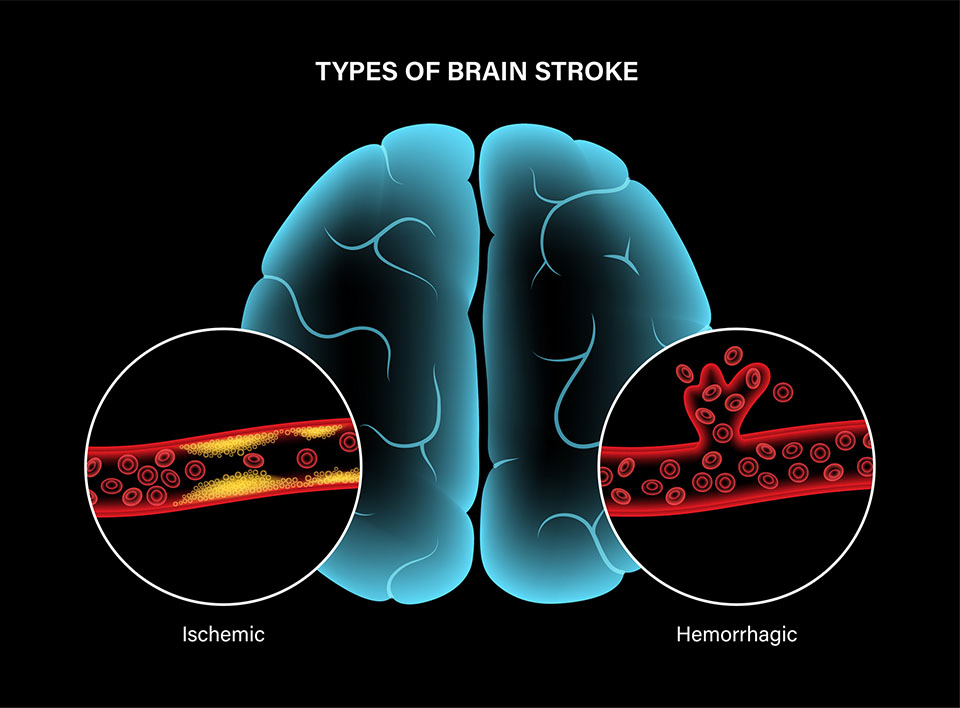
Ischemic Stroke
This type of stroke happens when a blood clot blocks a vessel in the brain, stopping oxygen and nutrients from reaching the brain tissue. It’s the most common stroke, accounting for 87% of cases, according to the American Stroke Association.
Hemorrhagic Stroke
Known as a brain bleed, this occurs when a blood vessel in the brain bursts, leading to bleeding in the surrounding areas. This bleeding increases pressure in the brain, damaging brain cells. A frequent cause is an aneurysm, often triggered by high blood pressure.
Transient Ischemic Attack (TIA)
Often called a mini-stroke, a TIA is caused by a temporary clot that disrupts blood flow to the brain. It doesn’t lead to permanent damage but is a serious warning sign of a potential future stroke.
Cryptogenic Stroke
Sometimes, despite thorough testing, the cause of a stroke remains unknown. These strokes are called cryptogenic. The American Stroke Association notes that about one-third of ischemic strokes fall into this category.
Brain Stem Stroke
This rare stroke affects the brain stem, not the brain itself, potentially impacting both sides of the body. It can result in a “locked-in” state, where a person is fully aware but cannot move or speak.
How Can a Stroke Affect Your Brain and Body?
A stroke happens when the brain doesn’t get enough oxygen, which can damage brain tissue. While each stroke is different, strokes often affect people in similar ways.
If a stroke blocks blood flow to a part of the brain that manages a specific body function, that body part may not work properly. For instance, a stroke in the back of the brain can impact vision.
The impact of a stroke depends on where it occurs in the brain and how much damage it causes. Since each side of the brain controls the opposite side of the body, a stroke on the left side affects the right side, and vice versa.
Strokes can cause a variety of issues, depending on their type, severity, and location. These issues can include:
- Weakness or paralysis on one side of the body
- Trouble with speaking or understanding language
- Vision problems
- Difficulty with coordination and balance
- Memory loss and thinking difficulties
- Emotional changes like depression or mood swings
- Feeling very tired and having low energy
- Changes in feeling, like numbness
- Difficulty swallowing
- Problems with bowel and bladder control
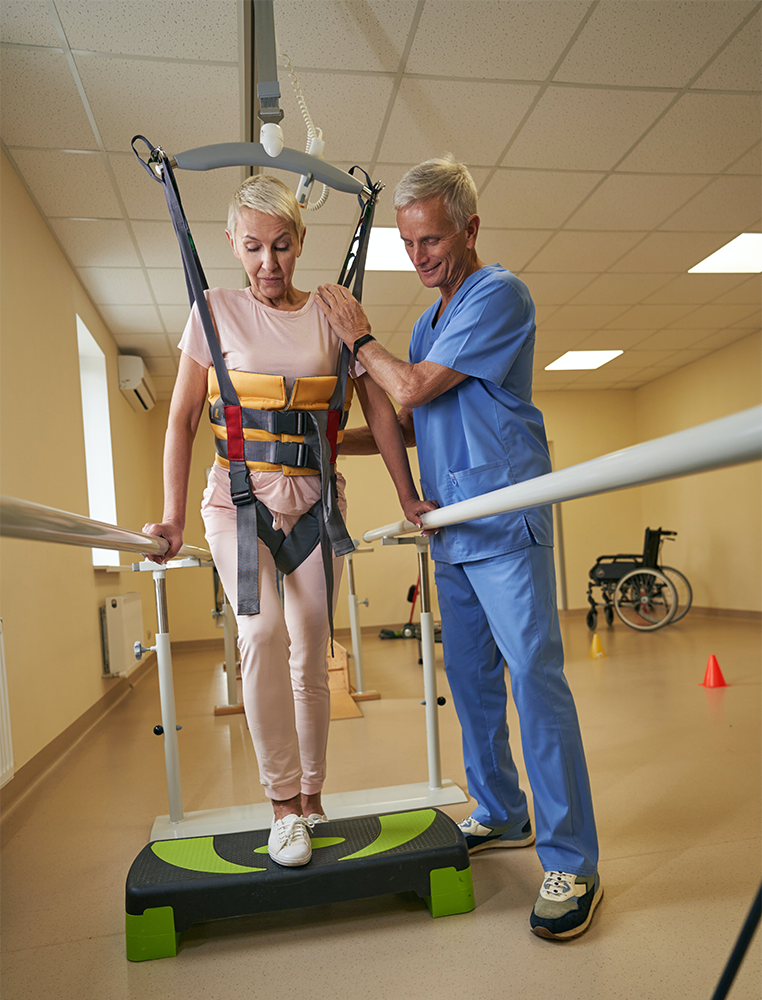
Since the brain is in charge of all body functions, a stroke can affect many areas, sometimes permanently. However, with rehabilitation and therapy, you can improve many of these effects.
MeRT treatment for stroke recovery can be a major step in that improvement.
MeRT Treatment for Stroke Recovery at the Brain Treatment Centers of Columbus and Cincinnati: What to Expect
Before deciding if MeRT is the right treatment for you, call us for a free consultation with our New Patient Coordinator. This is a no-obligation call, where she will discuss your symptoms and history, answer your questions, and explain the treatment in full. This includes all fees and protocols.
Then, once you decide to take the next step, we will set up an appointment for initial testing. This appointment will last 45 minutes to an hour. After that, we will analyze the results and schedule you for a consultation.
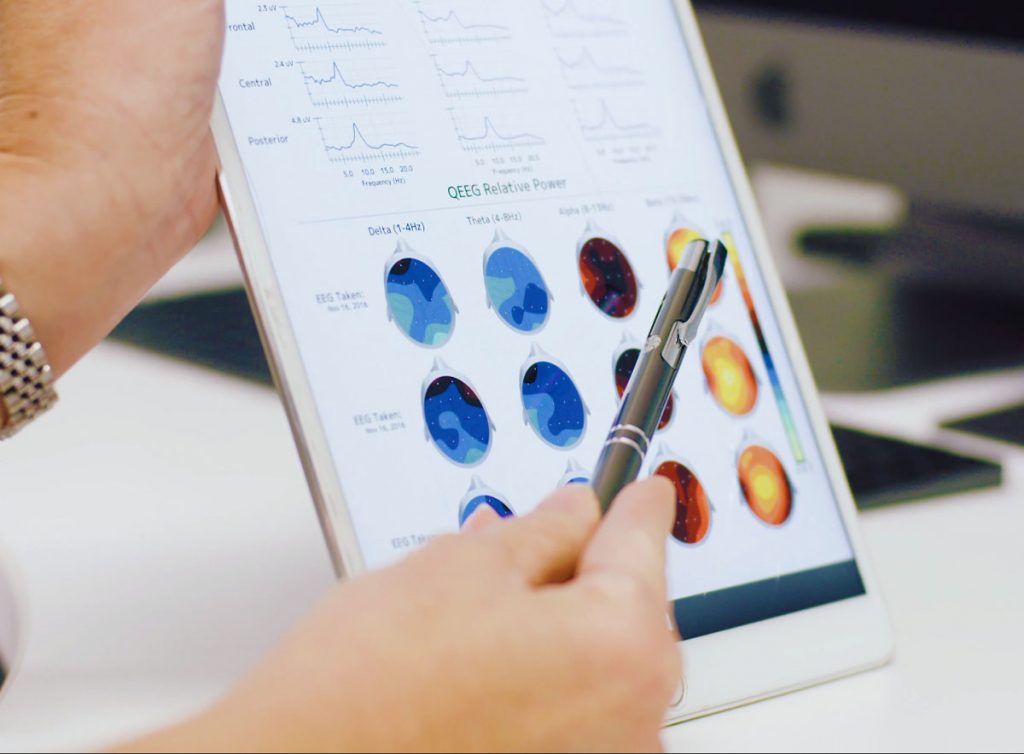

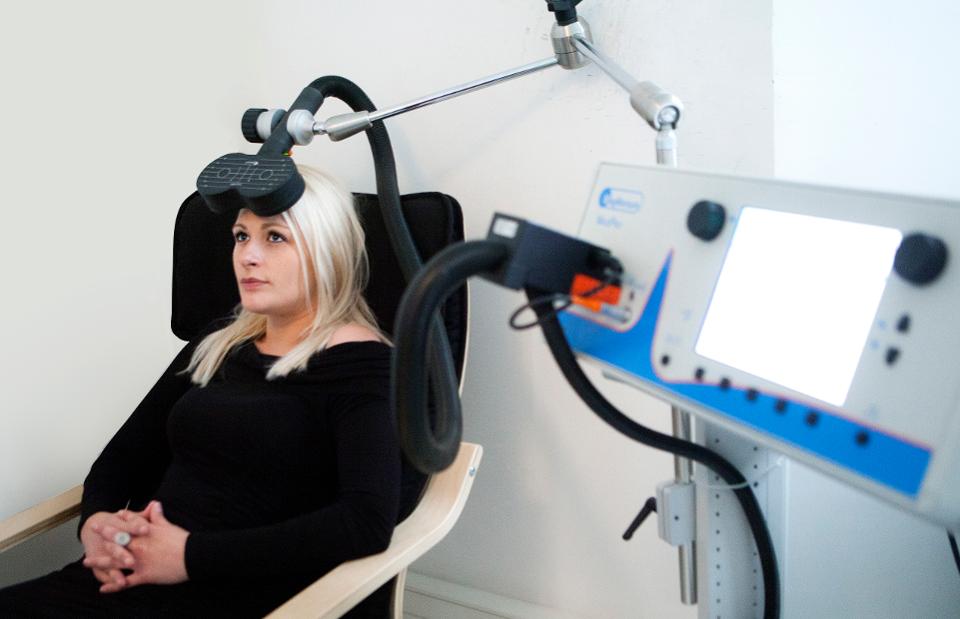
Talk with Our New Patient Coordinator
She can answer your questions, explain the procedures, and review all details. Or fill in the form at the bottom of this page, and she will contact you.
The MeRT treatment protocol comprises three steps:
1. Testing
At your first appointment, we will perform two simple tests: a qEEG and an EKG. These tests are painless, and we perform them right here in our office.
For the EEG, we place a cap on your head to measure the electrical activity in your brain and map out any areas not performing as they should. We also perform an EKG to record your heart’s electrical signals.
Once we perform these tests, our team will carefully analyze the results. Based on this analysis, we develop a treatment plan customized to your specific condition.
2. Consultation
After your tests are complete and we’ve reviewed and analyzed them, you will have a one-on-one consultation with Dr. Mehra Tarun or Nurse Practitioner Linna Morgan. You can either do this consultation in person or virtually from the comfort of your home.
During this consultation, we will discuss your test results and treatment plan. We will also answer questions and let you know more about what to expect during your treatment period.
3. Treatment Period
During the treatment period, we will perform two weeks of TMS treatment at a time. After each two-week period, we will perform a new set of tests (EEG and EKG) to see how you are responding.
Please note that we highly recommend a minimum of four weeks of treatment to determine if you are responding positively to treatment, both clinically and on the repeat qEEG. If you are experiencing improvements, we recommend an additional two to four weeks of treatment for long-lasting results.
We monitor your progress based on the new EEG results and symptom improvements. You will also have a consultation to confirm that changes are still showing in the testing.
Most conditions treated with MeRT provide noticeable and long-lasting results after six weeks of treatment. However, each patient is different, and the results may vary.
Insurance
Unfortunately, we do not accept insurance nor file it on your behalf.
Currently, MeRT is FDA-cleared for Major Depressive Disorder and Obsessive-Compulsive Disorder (OCD). For conditions other than Major Depressive Disorder and OCD, insurance rarely reimburses any of the costs associated with treatment.
Questions? Need More Information? Call our New Patient Coordinator.
We know how difficult it can be to decide on a new treatment, particularly if past treatments haven’t gotten the results you’d hoped for. You may still have a lot of questions about whether MeRT is the right treatment for you.
We want to make sure you get all the information you need to make the best possible decision, and that begins with a call to our New Patient Coordinator.
The New Patient Coordinator is here to help you. She’ll take the time to listen, answer questions, explain costs, and put your mind at ease. She can also help you get scheduled if you decide that, yes, MeRT is the right treatment for you.
When you think about it, making this one free, no-obligation call just might be the first step in recovering faster than you thought possible!

Contact our New Patient Coordinator.
Or fill out the form below and she will contact you.
Contact Us
For more information or to speak with our New Patient Coordinator, please fill in the information below.